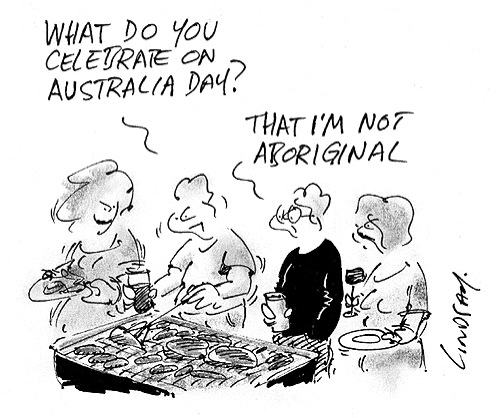 Neglect of social issues has swelled the number of indigenous people, particularly youth, in State jails and detention centres, former Labor Premier Peter Dowding says. The new WA Liberal Government deserves the opportunity to show it can make a difference where others have failed. Click cartoon to view.
Neglect of social issues has swelled the number of indigenous people, particularly youth, in State jails and detention centres, former Labor Premier Peter Dowding says. The new WA Liberal Government deserves the opportunity to show it can make a difference where others have failed. Click cartoon to view.
Indigenous prison rate scars Australia Day
Indigenous prison rate scars Australia Day
By Peter Dowding*
Australia Day is an opportunity for all of us to display patriotism and pride in our country. Indigenous people also observe the day as “Survival Day” which, given the history as now belatedly recognised by the Prime Minister, is fair enough.
But having got the apology out of the way, our leaders need to make a renewed effort to concentrate resources to overcome the inequity and discrimination of the past so that all of us can use the day for patriotism and pride.
West Australian Attorney-General Christian Porter’s recent unhappy discovery that WA’s jails are over-full should actually been less of a surprise to him than to students of social affairs in this State – after all, he was at the sharp end of the process as crown prosecutor making sure that demands by politicians on all sides for harsher sentences were being listened to by the courts.
The social tragedy of the cycle of drug and alcohol-fuelled crime, leading to imprisonment and release back into the community with no intervention, has escalated the prison population.
And let’s be frank about the nature of the social group most affected by this cycle – it is the indigenous community. In WA, the latest ABS statistics disclose that an indigenous person is 20 times more likely to be imprisoned than a non-indigenous Australian. The average across Australia is 13 times.
To a significant extent, these numbers reflect the failure of our leaders to provide resources to address the drug and alcohol problems of hundreds of West Australians, except, that is, by banging them up in prison at vast cost to taxpayers.
The total adult prison population today is 3913 of whom 42.3% are indigenous.
There are some very bad people banged up in prison, bad indigenous and bad non-indigenous, but the vast bulk of indigenous prisoners are in these institutions as a direct result of behaviour from a lifestyle that has been allowed to deteriorate and entrench bad outcomes for adults and juveniles across the State.
It is not as though our dear leaders were unaware of the developing situation as they were collecting revenues at a rate never before seen in Treasury. Many concerned people were telling them that their Departments of Health, Education and that emasculated department formally called Welfare but now euphemistically called Child Protection, had ceased to make meaningful inroads into the social issues confronting indigenous communities. The escalation was predicted by the WA Department of Corrections in 1999.
To their eternal shame, recent WA Labor governments have been out to lunch on this issue and allowed the bureaucrats to waffle about programs and expenditures without demanding or funding programs for effective intervention.
Our community spends the vast bulk of taxpayers dollars on police, health and education. The idea is to improve the standards of behaviour, safety, health and education; yet I am not aware of any department report that can truly show an advance in these areas in indigenous society.
There are improvements and success stories from individual and community members but in the main they have nothing to do with Government policy achievements.
Now that the Government can no longer look forward to rivers of gold flowing into its coffers from the boom – which clearly was not the result of anything it did – it is time for it to examine the best and most economical way forward to meet this burgeoning prison population.
New prisons involve massive capital expenditure and even more unsettlingly, vast annual cost. On the other hand, drug and alcohol treatment centres in areas of high dependency are a lot cheaper. Such centres can be expected to produce long-term benefits and not just short-term removal of someone from society.
Then, of course, there is the problem of juveniles. If ever a society should be ashamed of its leaders, it is on the issue of imprisoning children, but in many cases there are simply no alternatives. However, consider the statistics in this State: the total juvenile and remand centre population is 138 of whom 74.6% are indigenous.
We should demand not token efforts to provide after-school activities, youth centres and the like, but properly planned, managed and funded centres particularly in communities where the fabric of family life has been eroded.
The new State government has announced “a new nine-member Indigenous Implementation Board, to be chaired by Lt-Gen. John Sanderson”.
It is an indictment of the ALP which used to trumpet its commitment to social change that it failed so badly, and it is an opportunity for the Burnett Government to carve out credentials as a caring Liberal Government.
It deserves an opportunity to show that it can make a difference where others failed. If it can suceed, then perhaps in time there can be only one focus for remembrance on Australia Day.
- Peter Dowding is a barrister, former WA Labor premier, and member of CLA.
This article first appeared in The West Australian on 21 Jan 09, p20

